I’ve really gotten into marketing podcasts lately as my preferred mode of learning. They’re so convenient to listen to while walking the dog or taking a road trip.
The problem is choice overload. There are so many options that it’s hard to decide which show to cue up next.
So, I asked marketers to name their favorite marketing podcasts. The only rule is that they had to be shows from approachable, ground-level marketers (no big names).
To make it even easier to pick your next pod, I asked the hosts for a little background on their shows, the big takeaway they’ve learned from producing them, and which episode stands out as a must-listen. Enjoy!
Contents
5 of the best marketing podcasts, according to the pros
I’m impressed with the variety of podcasts people proposed. There are quick listens for bite-sized takeaways on specific tactics and deep dives into big topics that are shaping marketing right now.
1. SEO office hours
SEO Office Hours is a weekly, one-hour podcast that brings together some of the smartest search engine optimization pros in the business. But what’s really cool is that it’s a Q&A format recorded live from Zoom, complete with an audience full of the questions we all have about getting found through search.
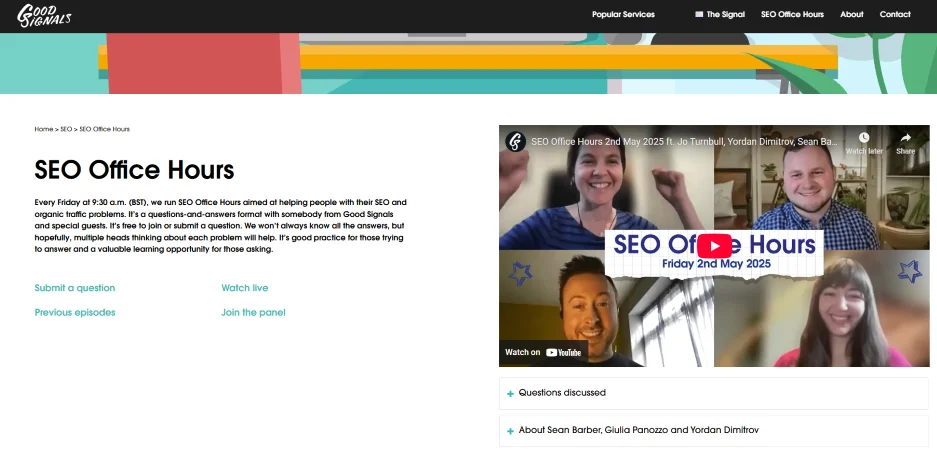
If a live Q&A chat about SEO reminds you of John Mueller’s old Webmaster Hangouts, that’s intentional. “When John stopped, I didn’t want that resource to disappear,” said Michael Chidzey, co-host of SEO Office Hours and CEO of Good Signals. “I reached out and asked if he’d be okay with me giving it a go, and he’s been incredibly supportive ever since.”
Michael tuned into Mueller’s sessions religiously. “They weren’t just Q&A sessions. They were a lifeline for anyone struggling with a traffic drop, wanting to sound out a new idea, or discussing some sort of change or update.”
With Mueller’s blessing, he worked to create a similarly supportive atmosphere, but with a collaborative mindset. “Of course, I’m not John Mueller from Google, so I built the show in my own way,” Michael told me. “I invited special guests to bring their perspectives. The first was a good friend of mine, Jo Juliana Turnbull. She was so good that I asked her to come back as a regular host. From there, we evolved into a panel format with me, Jo, and two rotating guests.”
For Michael’s co-host, Jo, it’s the lack of barriers that makes the show special. “We welcome first-time speakers, we answer all SEO questions, there is no such thing as a silly question,” she said. “People feel welcome, and we have a regular group of attendees from all over the world.”
The live format plays a big role in the podcast, since it lets the audience run the show. “As a host, I’m constantly watching the audience’s expressions: puzzled looks, nods of agreement, those moments of real engagement,” Michael said. “That dictates whether we dig deeper into a topic, clarify something, or swiftly move on to the next question.”
“Today, SEO Office Hours feels less like a podcast and more like a weekly gathering of some of the smartest, most generous people in the industry,” Michael added. “And honestly, even if I weren’t running it, I’d still be there every Friday.”
One big takeaway
The lesson for Michael is that consistency wins the day. “When we started SEO Office Hours, I set a target: every Friday for three months, no matter what,” he said. “Without that commitment, it would have been easy to stop after the first or second episode. But when giving up isn’t an option, you focus on making it better and better—and on optimizing your time to keep it going.”
“I think that mindset applies to everything in marketing: whether it’s launching a newsletter, building a social presence, or implementing a content strategy. Consistency compounds. The longer you stick with it, the more valuable it becomes.”
The past episode to have in your playlist
Michael said they’ve begun rotating in occasional co-hosts, and that’s expanded the show’s ability to deliver diverse ideas. “One of my favorite episodes was when I sat in the audience myself and Yordan Dimitrov co-hosted with Jo,” he said. “It was amazing to experience the show from the audience’s perspective and see just how valuable—and fun—it is when you’re on the other side.”
🛑 Podcasts help get more people to your website. Download 25 Ways to Increase Traffic to Your Website for even more.
2. Market Movers: Building Brands & Links with Linkifi
There’s nothing niche about Market Movers: Building Brands & Links. Each week, the show’s co-hosts (and Linkifi co-founders) Christopher Panteli and Nick Biggs invite guests with wildly different backgrounds and takes on the world of marketing.
That variety means we listeners get tips on making AI work for marketing one week, and the next we learn how to keep overtly salesy “knobheads” out of our online community.
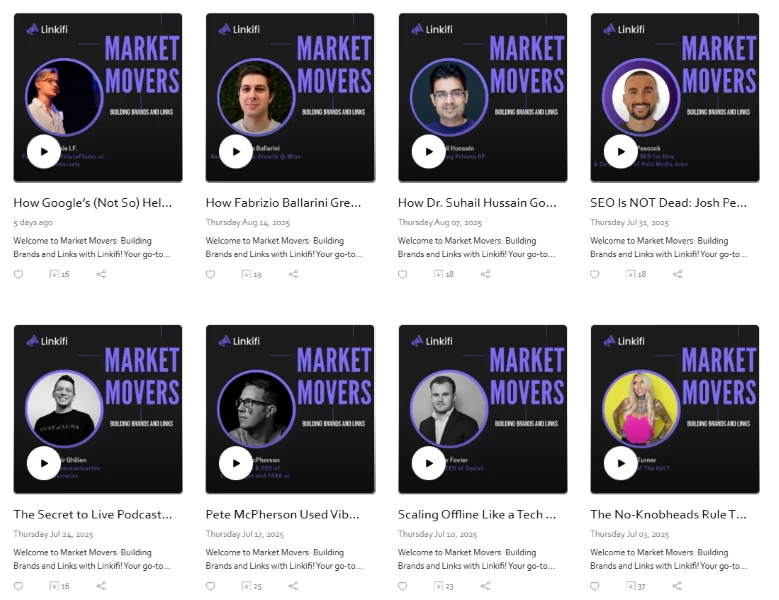
“We’re broader than a lot of marketing shows,” Christopher explained. “We don’t stick to a narrow niche. We cover a wide range of topics and invite a variety of guests. A lot of them we’ve actually met in person, often at conferences. Having that prior connection really breaks down the third wall and makes the conversations more open.”
That open exchange of ideas that happens when professionals meet is exactly the vibe Christopher and Nick curate on their show. “We were doing a lot of networking at conferences and kept meeting interesting people with great stories and insights,” Christopher said. “You pick up so many useful tidbits at conferences that it almost feels like a waste not to share them.”
My favorite part of Market Movers is the enthusiasm Nick and Christopher bring to learning right along with the audience. “We don’t pretend to know everything, and we’re genuinely curious,” Christopher said. “When a guest talks about something we don’t fully understand, we’re not afraid to ask more questions and dig deeper.”
One big takeaway
If you find yourself stuck in the planning phase of projects for too long, you’re not alone. Running the Market Movers podcast has helped Christopher get past his analysis paralysis.
“One of the biggest mindset shifts I’ve had is that you just have to test things and get them out there,” Michael said. “You can plan forever, but real value comes from launching and learning in real-time. Whether it’s a new funnel, an email sequence, or anything else, it’s better to put it live, get feedback, and make changes on the fly.”
“Some of the best results I’ve seen have come from launching something that flopped, tweaking it, relaunching it, and eventually figuring out what worked and why,” he continued. “That’s been the biggest shift for me, to stop waiting for perfect. Just launch, learn, and refine.”
The past episode to have in your playlist
“Personally, the solo interview I did with Tim Stoddart really stuck with me,” Christopher said. “His story is powerful. He’s overcome a lot and achieved a huge amount, and I think he’s in a really good place now. That episode definitely resonated with me, and I’d recommend giving it a listen.”
3. The Marketing Mindset Podcast
Colby Flood prioritizes an “Education First” philosophy at his agency, BrighterClick. That mantra drives The Marketing Mindset—a podcast that gets in the weeds of ground-level marketing with people who live and breathe it every day.
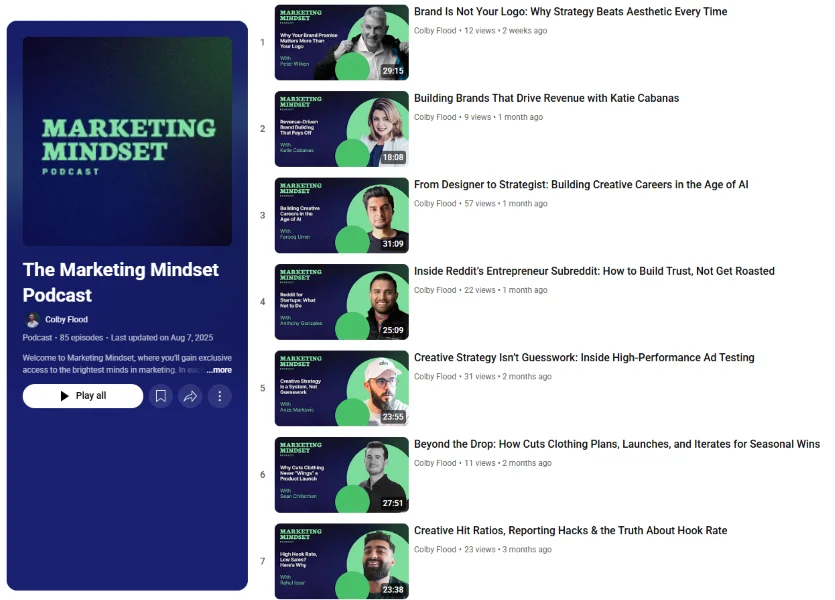
“What I think sets Marketing Mindset apart is the intent behind it,” Colby said. “Everything we share is driven by a single priority, which is helping people grow and learn, both personally and in their business. That means keeping the content transparent, trustworthy, and free from hidden agendas.”
I love how they dig deep into a specific topic in each episode. Look over the list and you’ll see titles like “How to start selling on TikTok Shops” and “Creating a Facebook Ads Creative Report Template.” There’s even a seven-part series dedicated to building a high-level creative strategy process.
“My vision for the podcast has evolved from being a place to communicate with people already well-known in the industry, to also finding the people working in the weeds to have them share their expertise, and help build their personal brands,” Colby said.
“Our goal is simple,” he added. “Keep the main priority the main priority, which is delivering honest, actionable insights that help people succeed.”
One big takeaway
I’m guilty of reading a marketing success story and forgetting all the background context that led to the result. Colby said that getting the full story from his guests reminds him of all the turbulence that happens before a smooth landing.
“One of the most refreshing things I have learned from hosting the show is that a lot of growth lessons come in hindsight,” he said. “Yes, there are people who can plan and execute exactly as intended, but more often the real breakthroughs are understood retrospectively.”
“On social media, it can seem like every success story was the result of a flawless plan,” Colby explained. “People share how they did X, Y, or Z, and it led to a big win, and it can give the impression that it was all intentional from the start. In reality, many of those wins become clear only when you look back and analyze what actually drove the results.”
“Through my own experience and countless guest conversations, I have realized the value of post-implementation reviews. Taking the time to reflect on what truly worked and why can turn everyday actions into long-term growth lessons.”
The past episode to have in your playlist
“One episode that really stands out to me was my interview with Ben, the CEO of True Classic,” Colby shared. “Before that conversation, I was a meticulous planner. I would map out the year, then the quarter, then the month, break that into weeks, and even down to daily tasks. Planning has value, but Ben really shifted my perspective on execution.”
“He emphasized the importance of focusing on what needs to be done today or this week, especially in a fast-moving business. Things change so quickly that planning too far ahead can sometimes work against you, particularly in a startup.”
“Looking back, I think my heavy focus on planning was a bit of a defense mechanism to avoid failure. But real growth comes from failing fast, learning quickly, and pivoting when needed. That episode helped me embrace the idea of spending less time perfecting a plan and more time acting on it.”
4. The Marketing Chatroom
If you’re looking for a little fresh air in the sometimes stuffy confines of digital marketing, I highly recommend giving The Marketing Chatroom a listen. Host Kayla Bryant, general manager of Two Trees PPC, brings a vibe that she describes as “upbeat, slightly silly, and that should feel like you’re talking to a friend.”
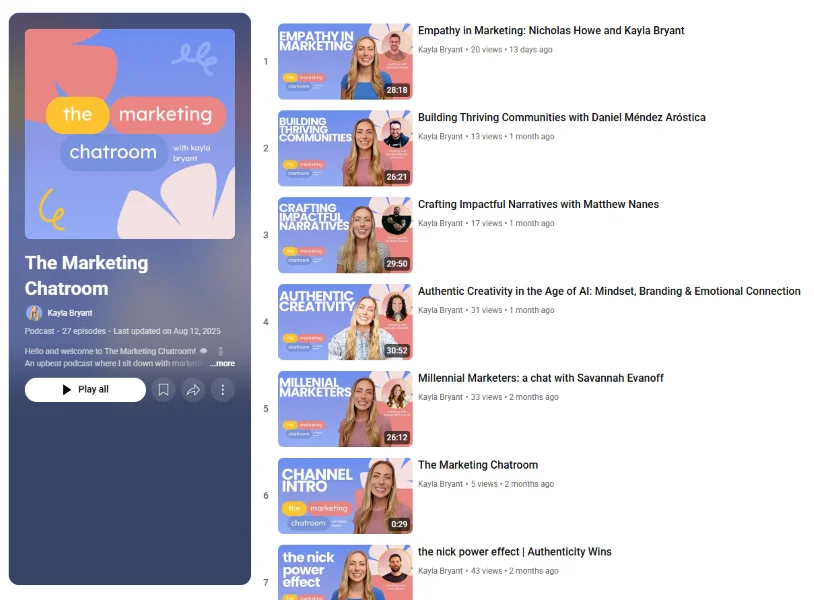
“Based on what I hear from guests and listeners, my podcast is more approachable and casual,” she said. “I talk with marketers about their real challenges and unique approaches toward success in their careers.”
Kayla and her guests get into the tactical side of marketing often, but the best bits for me are the episodes that explore soft—but critical—marketing skills like empathy and creativity. It’s interesting to learn how people in the field put those ideas into practice.
“I thought it would be cool to have a platform to highlight insights from marketing professionals in a variety of industries, roles, and places in their careers,” she said. “I’ve learned that as a host, I don’t have to be perfect or have a formal plan or specific questions prepared. As long as I have a guest with a story to tell and a general episode theme in mind- being open to a genuine conversation about something the guest is passionate about or expert at produces the best results.”
One big takeaway
Remote work has plenty of benefits, but sometimes it can feel a little isolating. Kayla said that listening to her guests confirms that a collaborative attitude is still critical for marketing success.
“Across the board, through my conversations, I’ve noticed that the most successful marketers (in my opinion) are those who have a true team mindset,” she explained. “They’ve become leaders in the space because they rise by lifting up others. They all started in the trenches doing the work, but they’ve found opportunities to improve upon their own work and taught others along the way. They aren’t afraid to share their knowledge alongside their challenges.”
The past episode to have in your playlist
“I struggle to not label every episode as my favorite, because each one is so interesting and unique,” Kayla told me. Fair enough, I’m not sure I can pick favorites from my work, either.
But if I were picking a place to start in the Marketing Chatroom, I’d say the chat with David Young on the power of storytelling. Storytelling has become almost cliché these days, but David does a great job of grounding it in results.
5. Plugin.fm
Where many podcasts cover marketing broadly across every industry, Plugin.fm stays narrow and deep by helping practitioners build a software business to navigate various growth challenges.
“Most marketing podcasts are marketers talking to other marketers,” said Goran Mirkovic, the chief marketing officer at Freemius, who co-hosts the show with Patrick Rauland. “Ours is different because it speaks directly to indie software makers and encourages them to take bigger swings with their products.”
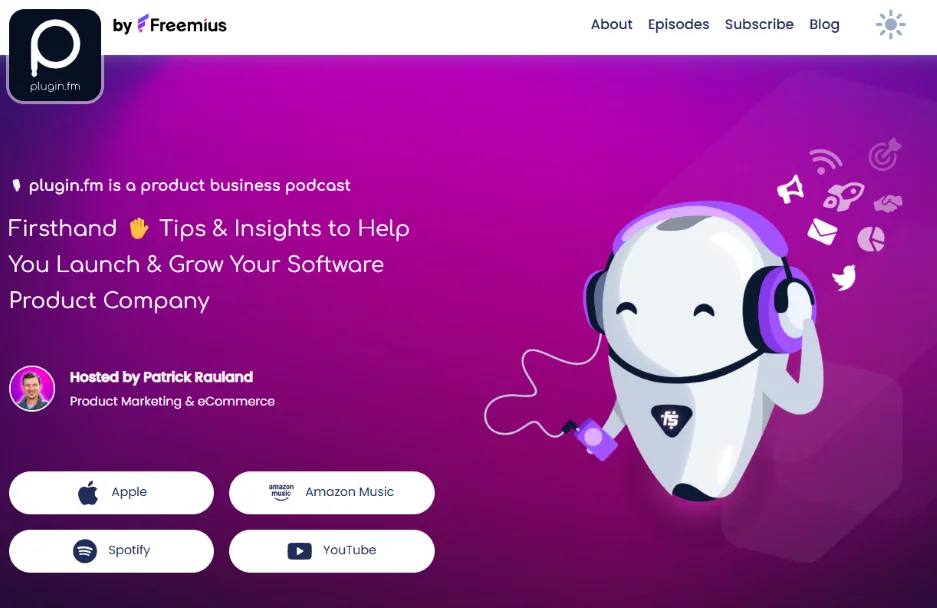
Originally, the show was a great way for the Freemius folks to learn about their target audience’s struggles and to build relationships with industry leaders. “The podcast gave us a reason to sit down with them for an hour and ask the questions we genuinely cared about,” Goran said.
As they compiled more episodes, though, Goran said they noticed the library had a different purpose. “[It became] more about co-creating useful resources with industry experts for indie founders and small software teams who don’t have mentors or investors guiding them. What began as a learning tool has grown into a library of practical stories and strategies from real builders.”
While marketing is a core component of the show’s topics, it also seeks to solve other hurdles like pricing experiments, subscription headaches, and customer support struggles.“These are the challenges that actually keep small teams up at night,” Goran said. “Our goal is to inspire and educate, not to sell.”
One big takeaway
Software startups can get caught up in the race to grow fast. So can we marketers. Goran said the conversations on Plugin.fm have reminded him that having a strong foundation is more important than growing sky-high too fast.
“Stop chasing ‘scale’ too early,” he said. “A lot of our guests reinforced the idea that you don’t need 10,000 customers. What you need is 50 loyal ones who give feedback, renew, and tell others about you. That shift in mindset is freeing. Instead of obsessing over growth hacks, focus on building something so useful that a small group sticks with you. Scale comes later if you get that right.”
The past episode to have in your playlist
As a content marketer who’s always riding the tumultuous waves of SEO, Goran’s pick for one of his favorite episodes of Plugin.fm hit home for me.
“One that really stood out was our conversation with Rand Fishkin,” Goran said. “He’s someone everyone associates with SEO, yet he told us that SparkToro gets fewer than 50 visits a month from Google. This is a guy whose work has been cited in Congress and even by the US president, but organic search barely moves the needle for his business. That hit our audience hard because it showed how much the game has changed and why you can’t rely only on Google for growth.”
👋 Free resource! The Definitive Guide to Lead Generation: 25 Ideas (+Tips & Examples)
3 more marketing podcasts for your learning pleasure
I got so many great recommendations for this list that I couldn’t expand on all of them. Here are a handful of additional marketing podcasts worthy of your next long drive.
6. Content, Briefly
Content, Briefly is one of my personal favorite marketing podcasts, so I was glad when another marketer suggested it. It’s a weekly interview show that focuses on content marketing.
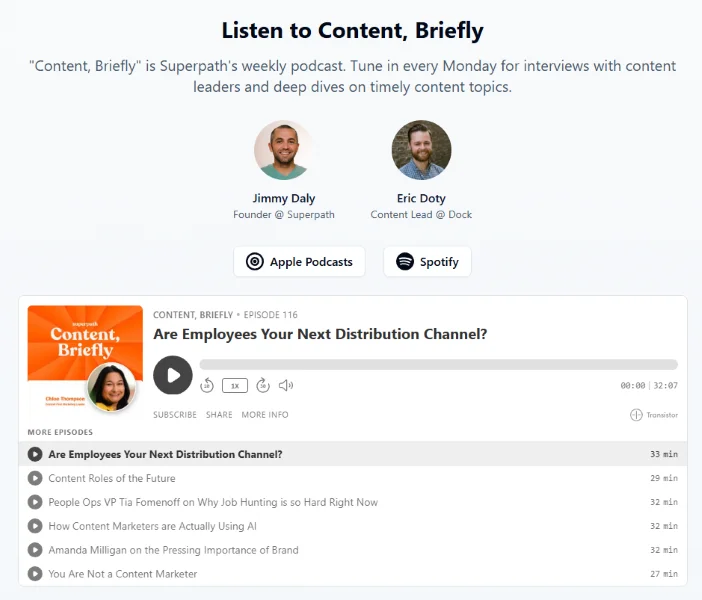
What I like about this one is that hosts Jimmy Daly and Eric Doty ask guests about the specific tactics and tools they use to do their jobs. So while there’s plenty of friendly chatting to enjoy, you also get some specific takeaways to apply.
7. The Artificial Intelligence Show
For good and bad, AI is an absolute wrecking ball in marketing. There are a few things it hasn’t changed significantly. That’s why I’m so grateful that hosts Paul Roetzer and Mike Kaput tackle these tumultuous topics in The Artificial Intelligence Show.
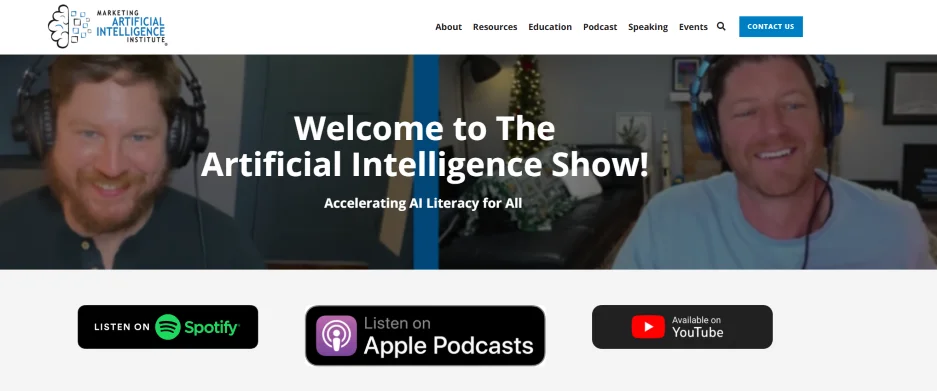
The show breaks down AI news, with a strong bent towards how it affects marketing. Even though it’s a current events format, there is a lot of actionable information you can use. For example, Paul and Mike often discuss the impacts of new AI tech that is useful in marketing.
8. Breaking B2B
I was lucky enough to gather some of Sam Dunning’s wisdom in a past post on SEO trends. His Breaking B2B podcast is a torrent of tactics and teardowns for technical SEOs, content marketers, and marketing generalists who need to drive more traffic from search engines.

Much of Sam’s content is geared towards B2B and SaaS SEO. But you can definitely glean loads of useful information, no matter what type of website you’re trying to rank.
The best marketing podcasts in 2025
I can’t say which podcast is best, but I can say which podcasts I think you should prioritize. It’s the ones that talk about the challenges you have. Scroll through their playlists, look up a few of the guests, and read some of the intros. You’ll get a sense of what they cover.
I also highly recommend reaching out to the podcasters. Ask about their show, share ideas, and suggest guests. We’re all communicators trying to make a connection, after all.







